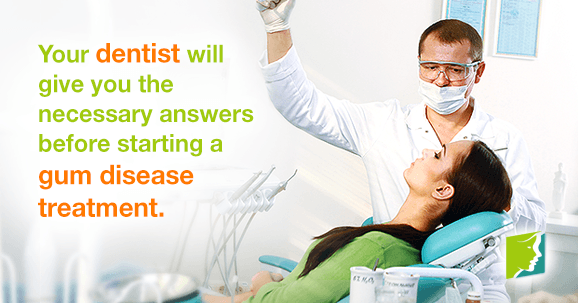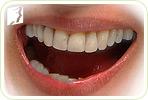Gum disease is a very common problem, especially for women experiencing hormonal imbalances, such as menopause. In order to treat gum disease, it is important to first see your dentist and get their expert opinion on your symptoms. Learn more about the five most important questions to ask your dentist before treating your gum disease.
What Type of Gum Disease Do I Have?
There is more than one type of gum disease, and determining which one you are experiencing will depend on the symptoms you have and how advanced are they. In most cases, gum disease begins as gingivitis, which occurs when there is an overgrowth of bacteria in the mouth that leads to gum inflammation. However, if left untreated, gingivitis can develop into the more serious periodontitis, where inflammation spreads to the root of your teeth. Independent from this process, many women also develop canker sores, an unrelated form of gum disease, for a variety of reasons.
What Caused My Gum Disease?
There are several factors which may trigger the infections or plaque build-up that lies at the root of gingivitis or periodontitis, and they must be fixed in order to get rid of the problem properly. Among women, these are very often caused or worsened by hormonal fluctuations, particularly estrogen deficiency. However, gum disease can also be due to poor hygiene habits, other underlying health conditions, an unhealthy diet, vitamin C deficiency, or fungal infections.In the case of canker sores, the causes may range from iron or B vitamin deficiencies to stress, low immunity, direct injuries to the mouth, or hormonal changes.
What Can I Do to Prevent Further Gum Disease?
Depending on the original cause, there are different things that you can do in order to treat and prevent developing gum disease. These typically include rebalancing your hormones, maintaining a healthy and well-balanced diet, exercising regularly, eating more Vitamin C, cutting down on alcohol, and giving up smoking.
Can Gum Disease Cause Me Other Problems?
While gingivitis itself is not a serious condition, if it progresses to periodontitis, it may lead to deeper infections and tooth loss. In addition, while it is rare, you should keep in mind that gingivitis has been linked to higher rates of heart disease, although the causes are unknown.
Why Are Women at Special Risk of Gum Disease?
Women are more susceptible to gum disease than men due to hormonal imbalances that occur throughout their lives, such as during menopause. Estrogen production can be affected during menopause, and low levels of estrogen can trigger gum disease twofold: they cause jawbones to start losing density and the gums to inflame, which provides a good nest for bacteria.
Gum disease is a treatable and common condition that can occur for a number of reasons. If it is a result of hormonal imbalance, it can be treated by taking herbal supplements, which work to restore hormonal imbalance and to improve the functioning of endocrine system as a whole.
Sources
- Fotek, P. (2012). Periodontitis: MedlinePlus Medical Encyclopedia. Retrieved September 24, 2013, from http://www.nlm.nih.gov/medlineplus/ency/article/001059.htm
- National Health Service UK. (2012). Gum disease. Retrieved September 24, 2013, from http://www.nhs.uk/conditions/Gum-disease/Pages/Introduction.aspx
- Vorvick, L.J. (2013). Canker sore - PubMed Health. Retrieved September 24, 2013, from http://www.ncbi.nlm.nih.gov/pubmedhealth/PMH0001993/


